Exclusive with Dragon Ball GT Rap Creator
Are you ready to Step Into the Grand Tour? Join me for an exclusive interview with the creator of the Dragon Ball GT Rap Intro, Shorty the Man!
The Dragon Ball GT rap intro is a divisive topic among Dragon Ball fans.
When it first premiered on November 7, 2003, some fans claimed that it represented everything that was wrong with the American Dragon Ball, while others praised it, and still to this day claim that it’s what the American Dragon Ball needed. They argue that GT was a failure everywhere else in the world but was a success in America, so the music must be part of the reason why.
Today I’m sitting down with Marcus Hall, otherwise known as Shorty the Man. He is the creator of the Dragon Ball GT rap intro.
This is the first time he has ever been interviewed.
We’re going to discuss the origin of the intro, how he approached the project, what it meant for his career, and how he feels about the discussion of his music.
Meeting Marcus

Derek: Marcus, take me back to 2003. Where are you in terms of your career and location?
Marcus: In 2003 I was in Dallas. I was working for an audio engineering firm, so I transferred to their Atlanta office to do some production work in ’99, but I had moved back by 2003. Then I was at the January Sound Studio in Farmers Branch, Texas, which is a suburb of Dallas. I had been working on some new material when I was approached about the Dragon Ball GT project.
Derek: Who is Shorty the Man? Where does that name come from?
Marcus: I had been rapping since ’87, way back when I was in junior high, and even in elementary school. I’m short, I’m 5’ 6”. And everyone has called me “Shorty” as a nickname almost my entire life, also since around ’87.
“Shorty the Man” came about because I no longer wanted to be short. I had grown into a man, so at that point I started saying I’m “Shorty the Man,” instead of just “Shorty.”
Back then, everywhere you went there were people called “Short” or “Shorty.” There was nothing to differentiate you from other people called “Short.” So I became “Shorty the Man.”
Derek: You had been rapping since ’87, but fans of Dragon Ball had not heard of your music at the time. And they still don’t know much about you. Is there a place they can go to learn more about you, and do you still create music?
Marcus: I do still create music. I don’t have a website or anything. Most of it is my own stuff that I write and produce, but mainly I mix other people’s music.
As far as my history, I was in a group called Tha Murder Weapon, and then the Shorty the Man: Never 2 Far album was supposed to be my first album, and then my 2 partners were supposed to do their own solo albums. But we separated after I did my own solo.
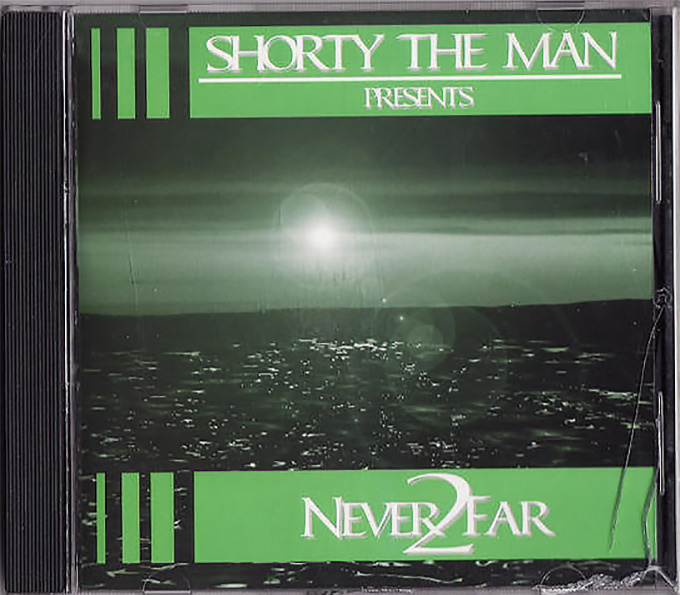
All three of us were in Atlanta, and once I left, that was like me leaving the group.
Stepping into GT
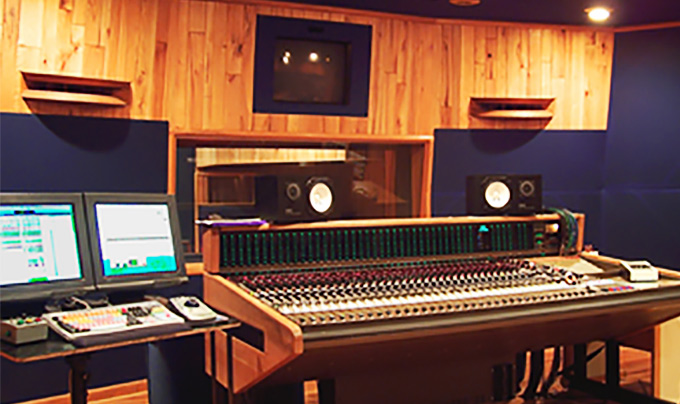
Derek: In 2003, FUNimation acquired the rights to Dragon Ball GT and announced that it would be syndicated on national TV. So how did you become involved with the production of GT’s intro?
Marcus: At the January Sound Studios there was a studio engineer I was working with named Tye Robison.
One day I was recording and he stops me and says, “Hey, I know a guy, his names Mark.” That’s Mark Menza.
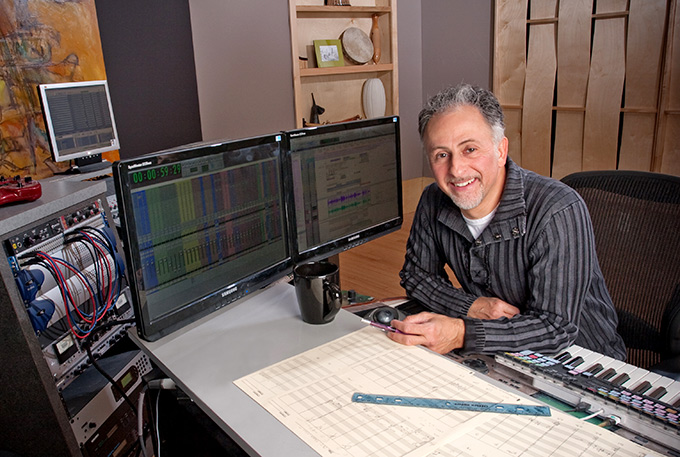
“He came to me and asked if I knew of any rappers who could write a rap about a cartoon.” He replied, “I know a lot of rappers, but I don’t know any who could properly write a rap about a cartoon, other than you. So would you be interested in that?” I say, “Yeah, sure, no problem. What cartoon is it?” He says, “Dragon Ball GT.” I said, “Wow, I actually watched a little Dragon Ball Z, so that would be cool.”
But he says, “Nothing is in stone yet.” Mark had about 6 other people that he was supposedly trying out to see if they could do it.
So at that point he got me in touch with Mark, who called me, and I went out to his studio. He had some music laid down, it was the rough version of what you hear on the intro. It wasn’t finished. He gives me a summary page saying that, “These are the things that they want to highlight in the theme song. Can you come up with something that includes this stuff in it? Get back to me in a week or so.”
Derek: So it was like a job interview process?
Marcus: Yeah, it was kind of like that. A week or so later he calls me up and says, “I heard from 3 other guys, and the 2 others didn’t come through, so I’m just waiting on you.” So I said, “Cool. I’m done and finished.”
So I went back out to his studio, he played the music, and I started in on the first verse.
He stopped it and said, “You’re my man. Can we do it tonight?” I said, “Let’s do it.”
That’s how it happened!
The Theme of the Theme
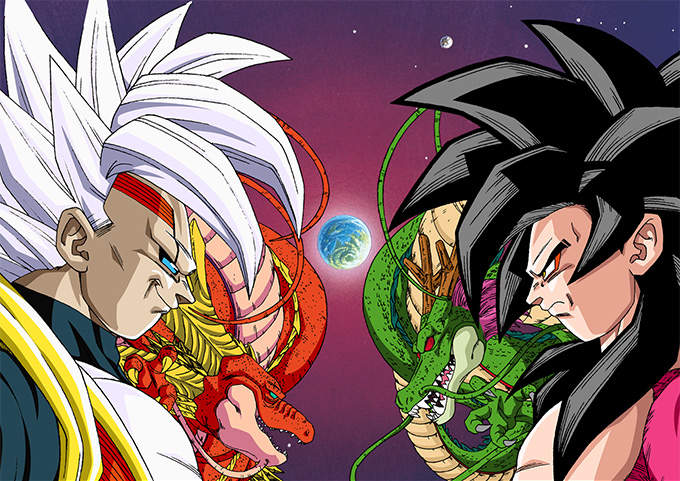
Derek: So you were approached by Mark Menza and it sounds like he already had this idea in mind that he wanted to do this rap intro. What were you told about the series? You received some notes from him to hit certain themes? Where did he get that information from?
Marcus: I suspected that since FUNimation had contacted him about the theme song, that this is what they had planned for the cartoon in that upcoming season, or throughout the entire Dragon Ball GT, and this is what they wanted to highlight in the intro.
He gave me this sheet and it had little notes on it like, “Super Saiyan 4,” and “Pilaf makes Goku a child again.” So I said okay, and went line for line and tried to include whatever they said was happening, in the rap.
Derek: So you had a synopsis of the series, and then the approach to the intro was like a self-contained story.
Marcus: There you go.
Derek: There was no producer who said, “This is what we’re trying to achieve.”?
Marcus: No. Hahaha. None of that. It was just Mark and I showing up at the studio one day.
Then I went to his studio and he gave me a sample of the music that he had started. At that point he had the drums and the guitar; that was it. Because he had said that this part had been approved. He had some other tracks, but he didn’t want to give them to me to write to because it may not be approved.
So he gave me those two tracks, the synopsis, and I went home and did my thing. Like, “Alright, whatever.”
The Lyrics
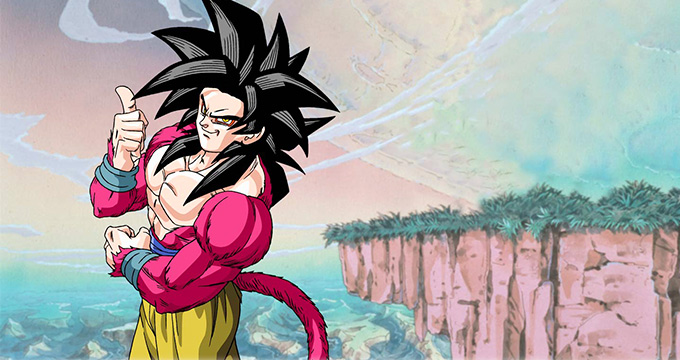
Derek: Please elaborate on your approach to writing the lyrics. It has dramatic vocal backgrounds, and the instrumentals are unique. What inspired the chanting sound or the way in which the lyrics are sung?
Marcus: That’s just how I felt about the music.
For me, it’s whatever the music tells me to do; the way the verse goes.
The chanting? I think even Mark is recorded on the chanting. We were getting all types of people. People who just stopped by the studio, we said, “Hey, come in and lay a verse, “DRAGON BALL GT!”” Screaming, all of that. So it was a bunch of different voices, as far as the chanting.
But as far as the verse goes, vocally, that’s just how I did it. We didn’t talk about, “Hey, do it this way or that way.” That’s kind of the way I wrote it, so once I started he said, “That’s the way we want it.”
Derek: I’ve heard rumors from fans that Seán Schemmel was one of those voices, and also Stephanie Nadolny, who are the adult Goku and child Goku voice actors. Is there any truth to that?
Marcus: No. The only people who were there were Mark, one of my buddies named Cedric, two guys who played instruments, a lady who played the piano, and two graphic designers from down the hall who just happened to stop by. Those were the voices. No one else.
Derek: Is there a place where people can find the official lyrics? Still to this day, fans are confused by the vocal chants and don’t know what they’re saying.
Marcus: Haha. Yeah, here are the lyrics:
Witness the ultimate battle
Between the greatest of warriors
In all the worlds
Time is running out
GT!!
For many a years the dragonballs have always been there
And now the righteous, the innocent and just
Must now depend on themselves to defend
mother earth from the rebirth of the ultimate end
Now the tournament is over the closer the greed creeps
For every good that’s done the further the evil seeps
Inside the very spirit that makes the good compete
To get the just to prevail, the righteous can’t fail
Step into the grand tour, a brand new adventure begins
Another challenge for Goku and his friends
Now he’s a Saiyan strong, Pilaf makes him a child again
The Dragon Balls are turning, burning to end
The world and everything within
The ultimate battle between good and evil whose gonna win
When the sand clock dictates the consequence
Will our heroes have the strength to be our last line of defense
Lets override the powers that seek to destroy
Steal the innocence of our worldy joy
With their evil schemes, hungry for the destruction that the evil brings
The power to provoke the hope to lose sight of the greater good
Then allow the rage to catch a blaze like sandalwood
Heroes struggle
To save earth
Who will prevail
Time is running out
GT!
Derek: What is the official name of the song?
Marcus: Step into the Grand Tour. In the beginning it didn’t have a name, but once we finished it, I remember Mark saying “Step into the Grand Tour” is the name.
Derek: So Mark named it?
Marcus: Yes. I didn’t name it. I just wrote my verses into it. And we didn’t name it until the end.
Derek: Do you have other Dragon Ball raps that have been unreleased and that you can share with fans, or was it a one-time thing?
Marcus: A one-time thing. I didn’t write any more. But if I remember correctly, I had two verses for it, but we only recorded one verse.
We kind of chopped it up: used this piece here, that piece there. Like when we’re coming back from the commercial we used a 15 second version. But at the beginning it’s the full version. Then if there’s an ad on TV, we want a 35 second version. Things like that.
Inspirations
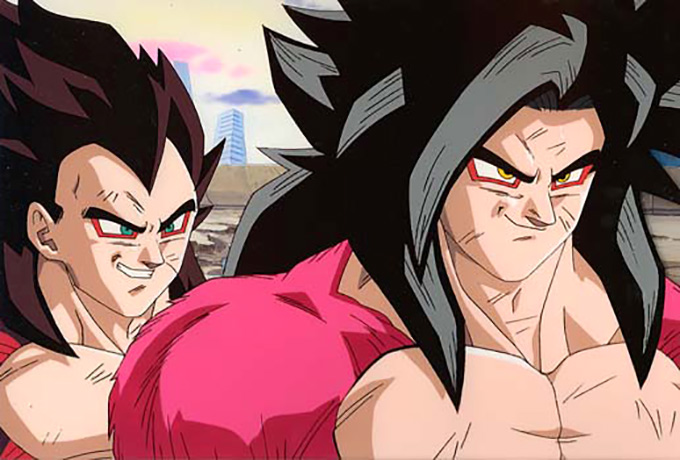
Derek: As an artist, who do you take inspiration from? Who are your favorite artists?
Marcus: Almost all music, from Phil Collins, Elton John, Bob Marley, Outkast, Rakim, Willie Nelson, B.B. King. I love music, so that’s where I draw from.
Derek: Was there anybody that you felt you were drawing from for the inspiration of this intro?
Marcus: Well, after recording the Never 2 Far album, I was able to be a little more aggressive on this intro than I had been on my album. It was a good thing for me. It was a chance to release.
Although I remember when I first wrote it, I recited it to myself before Mark heard it and I thought, “Boy, this might be a little too rough. I don’t know if they want it hard like this.” So when I went in I said to him, “I probably wrote this a little too hard.” But that’s how they wanted it. So for me it was a release at the time.
FUNimation’s Approach
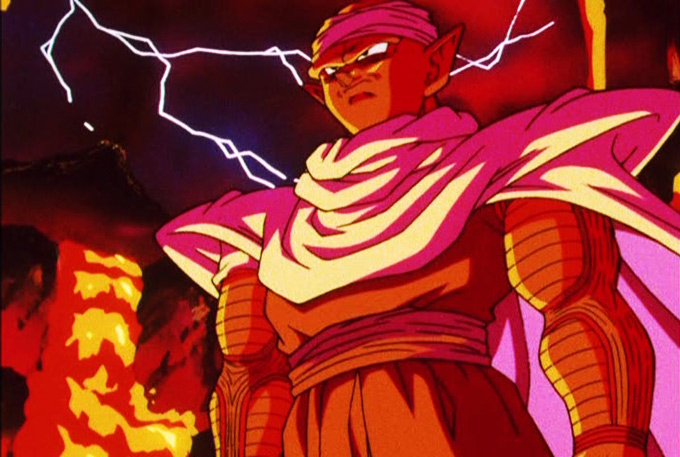
Derek: The original Japanese version of Dragon Ball GT is a lighthearted adventure with fantasy and science fiction elements. It has an emotional and cheerful soundtrack. So why do you feel that FUNimation did the opposite with the American soundtrack, making it heavy, grungy, and with a rap intro?
Marcus: I was thinking that they were trying to attract a different type of audience. Not a younger generation; just a new generation. That’s how I looked at it. They were trying to capture a separate audience at that point. Maybe the core audience was already there, so they didn’t need to do anything to bring in the core audience. Like, ‘They’re going to watch it regardless. But we can capture a separate audience with this theme song, and then we can pull them in.’
Derek: Do you think that this approach to the soundtrack and the rap intro in particular has anything to do with appealing to African American youth?
Marcus: Absolutely! Hahaha. I thought that was the target generation that they were trying to capture.
Because like I said, I knew about Dragon Ball Z, but I never really followed it. And I can say, after the theme song and GT came out, and maybe it was just me because I was on the intro, but I know a lot of my family and friends got into it because, “Hey. Did you know that’s Shorty on the intro?” So that’s who it would appeal to at that time. So, yeah, I definitely thought so.
There is no doubt that it was a deliberate attempt to reach the African American audience.
The Reaction
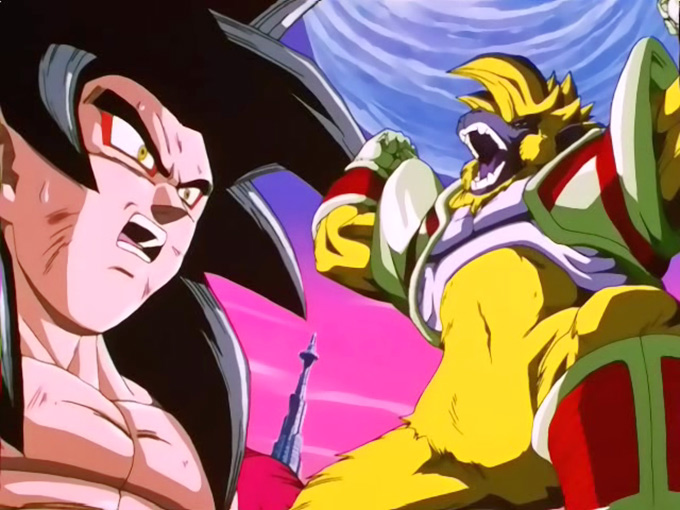
Derek: Were you excited for the premiere, on November 7, 2003, because your music is going to be heard by millions of people?
Marcus: I missed the premiere! I was excited, but I actually missed it.
There were a lot of other people who caught it. But at the same time, I hadn’t told that many people. That’s because even though Mark told me it was a go and everything was good, in the back of my mind I was thinking, “Yeah, I’m not going to go around telling people, because then if the cartoon comes on and it’s just the music, and there’s no rapping, people would be like, ‘Hey, I thought Shorty was on this.’” I was still thinking that it was a bit aggressive for a cartoon, and I was skeptical at that time.
Derek: Some fans still feel like it’s too aggressive. What was the reaction of fans at that time? Did you hear anything from fans, and then how did you feel about that?
Marcus: At that time, no. I didn’t even look into if people liked it, because most of the people I told were my friends or people I worked with musically. Nobody that I didn’t know. I didn’t tell anyone at my job. Haha. So I honestly didn’t know.
It wasn’t until 2006 or 7 when I actually started to look. I went on YouTube. It was just one of those days. I started seeing all the comments. I mean, “Wow! They’re really talking about this!” Initially I didn’t hear any backlash or anything.
Derek: You said you read some of those comments on YouTube, and I’m not sure if you ever replied to them, but if there’s something you could say to your critics now, what would that be?
Marcus: I appreciate the criticism. Some people didn’t like it just because it was rap. Not necessarily because they felt that I was whack, or that I didn’t do a good job. They just didn’t like rap. Or it may be the case where they didn’t feel like Dragon Ball GT’s intro should be a rap. So if they feel that way, there’s nothing I can say to change that.
I can understand where these people are coming from. Especially if I had a cartoon I liked that they did a 180 on it with the intro.
So hey, I appreciate the critics, and I’m sorry they changed it on you. But I still like it and there are other people who like it.
Derek: Did you get any comments from the higher ups at FUNimation or the production team who gave you a pat on the back and said good job?
Marcus: No. Nothing.
Derek: So it was a contract gig, you did it, and then you didn’t hear anything else for years.
Marcus: There you go. That was it. Signed, sealed, here you go, pay me, bye. Haha.
Licensed GT Music
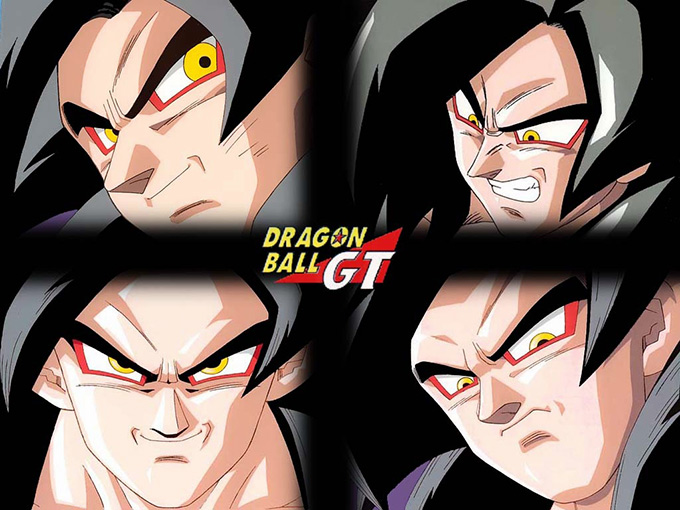
Derek: Will this music ever be sold on CD or be made available for download? What’s the situation with the licensing? Because there are fans who would like to purchase it.
Marcus: I don’t know. I remember Mark saying something about that way back then. That he didn’t think they would ever release it or try to sell it. As far as I know they never did. Well yeah, I know they didn’t, because I didn’t make any money from it, haha. I honestly have no idea where you can go to find it and buy it.
Looking Back
Derek: After going through that experience, do you feel that FUNimation made the right call with their approach to the music? And did you know at the time that your rap intro was just one part of changing the overall tone of the series?
Marcus: No, at the time I didn’t know anything about them trying to change the direction. I did feel like they were trying to reach the African American youth. But I didn’t know they were trying to take the entire cartoon in a different direction.
Do I think they made the right call? I don’t know! I could easily say, “Yeah, I got paid, brother, blah, blah, blah.” But overall I can’t say.
I did like it after the final product was done. I felt like I did a hell of a job on it; I really felt that way. So as far as that goes, I think they made a good job with choosing me. Well, I can say, if they had a choice of which theme or artist to go with, I think me and Mark did the best job at it.
As for the right approach, I can’t say.
Derek: Did this have an impact on your career? Did it improve it or affect it?
Marcus: No. Not that I know of. Looking back now I can see there were people who started to look for me because of the Dragon Ball GT intro and thought, “Wow, who’s that guy?” But at that time, no. I still hadn’t told many people.
Derek: Why do you think I’m the first person to interview you, after all this time?
Marcus: I never knew it was as big as it is. I just looked at it as a gig. It wasn’t until recently that it was like, “Wow, I didn’t realize that Dragon Ball was this big.”
This was the first time I’ve responded to the comments. I normally stay to myself and do my own thing.
It was only when I saw in your interview with Mark Menza who said that they had written the lyrics to the song that I thought, “Wow. Well, I should at least correct that.” Haha.
Other than that, I never saw a reason to say anything. Some people like it, others love it or hate it. Boom. Alrighty. Whatever they say is okay.
Exiting the Tour
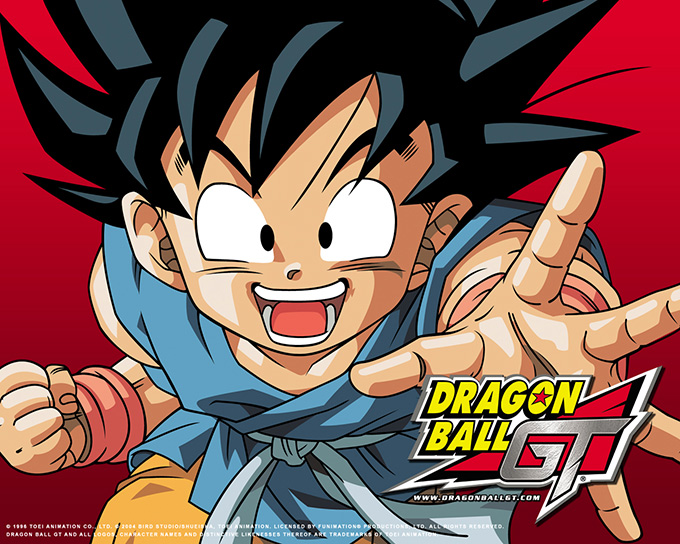
Derek: What does Dragon Ball mean to you?
Marcus: Oh wow, that’s a good question. What does Dragon Ball mean to me? Wow. Never even thought of that.
Well, I guess I always looked at it literally. I didn’t read much into it. I wasn’t a big follower of it, so to me it was the dragon balls that they were trying to get. That’s how I looked at it, because that’s as far as I went into it. That’s how I took Dragon Ball GT. For me, it was just that.
Derek: And as far as your career, it was just a gig. It went well and you’re happy with it.
Marcus: Yeah! It was a gig. It was a contract thing. I did my best at it. I really put my all into it.
Derek: Thanks, Marcus, I appreciate this interview.
Marcus: Thank you, bro!
' . $comment->comment_content . '
'; } } else { echo 'No comments found.'; }